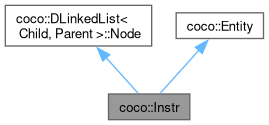Base interface on explicit computation steps in coco IR. More...
#include <Instr.h>

Data Structures | |
| struct | IVisitor |
| Instr visitor interface. More... | |
| struct | Visitor |
Public Member Functions | |
| Instr ()=default | |
| Instr (const Instr &)=delete | |
| Instr (Instr &&)=delete | |
| virtual | ~Instr () |
| template<typename T > | |
| T | accept (IVisitor< T > *v) const |
| template<typename T > | |
| T | accept (IVisitor< T > &v) const |
| template<typename T > | |
| T | accept (IVisitor< T > &&v) const |
| const InstrIndex & | index (void) const |
 Public Member Functions inherited from coco::DLinkedList< Child, Parent >::Node Public Member Functions inherited from coco::DLinkedList< Child, Parent >::Node | |
| Node () | |
| virtual | ~Node () |
| Parent * | parent (void) const |
| Child * | prev (void) const |
| Child * | next (void) const |
| void | insertBefore (Node *next) |
| void | insertAfter (Node *prev) |
| void | detach (void) |
 Public Member Functions inherited from coco::Entity Public Member Functions inherited from coco::Entity | |
| virtual | ~Entity ()=default |
| Module * | module (void) const |
Friends | |
| void | DLinkedList (Block *, Instr *) |
| void | DLinkedList (Block *, Instr *) |
Detailed Description
Base interface on explicit computation steps in coco IR.
NOTE Input/output is explicit in Instr, but implicit in Op NOTE Instr is may (not always) be a combination of multiple NN operations
One may find a set of supported instructions from "Instrs.h"
How to add a new base instruction in coco IR <<
To introduce a new instruction (whose name is INS),
- Append "INSTR(INS)" to "Instr.lst"
- Declare class INS which inherits Instr class in "Instrs.h" NOTE This class SHOULD be default constructible
Constructor & Destructor Documentation
◆ Instr() [1/3]
|
default |
◆ Instr() [2/3]
|
delete |
◆ Instr() [3/3]
|
delete |
◆ ~Instr()
|
inlinevirtual |
Definition at line 70 of file Instr.h.
References coco::DLinkedList< Child, Parent >::Node::detach(), and coco::DLinkedList< Child, Parent >::Node::parent().
Member Function Documentation
◆ accept() [1/3]
|
inline |
◆ accept() [2/3]
|
inline |
◆ accept() [3/3]
|
inline |
◆ index()
|
inline |
Definition at line 130 of file Instr.h.
Referenced by onert.experimental.train.dataloader.DataLoader::__next__(), coco::DLinkedList< Child, Parent >::joined(), and coco::DLinkedList< Child, Parent >::leaving().
Friends And Related Symbol Documentation
◆ DLinkedList [1/2]
|
friend |
◆ DLinkedList [2/2]
|
friend |
The documentation for this class was generated from the following file:
- compiler/coco/core/include/coco/IR/Instr.h